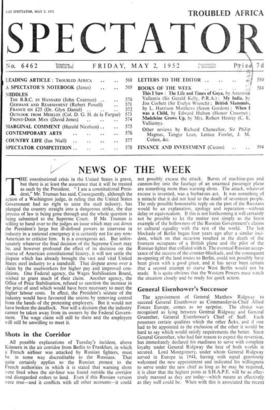General Eisenhower's Successor
The appointment of General Matthew Ridgway to succeed General Eisenhower as Commander-in-Chief Allied Forces Europe, comes as no surprise. The choice was recognised as lying between General Ridgway and General Gruenther, General Eisenhower's Chief of Staff. Each possesses certain qualities which the other itcks, and if one had to be appointed to the exclusion of the other it would be hard to say which would satisfy requirements the better. Since General Gruenther, who had fair reason to expect the reversion, has immediately declared his readiness to serve with complete loyalty under General Ridgway the best of both worlds is secured. Lord Montgomery, under whom General Ridgway served in Europe in 1944, having with equal generosity welcomed the new appointment and indicated his willingness to serve under the new chief as long as he may be required, it is clear that the highest posts at S.H.A.P.E. will be as effec- tively manned as they are today—which means as effectively as they well could be. When with this is associated the recent appoffitment of Lord Ismay to the secretary-generalship of the North Atlantic Council it is not too much to say that the affairs of N.A.T.O. on the military side are in better shape than they have ever been. General Ridgway, of course, has to be proved in his new surroundings, but the capacity he has manifested as a fighting soldier in Korea, and the experience of many of the newest weapons he has gained there, have rightly caused the news of his appointment to be received with complete confidence. That the new commander should, in existing circumstances, be an American was inevitable and entirely right. The only qualifying consideration arises from the relinquishment by General Ridgway of the United Nations command in Korea at a moment when a critical phase in the operations there may easily develop at any moment.



































